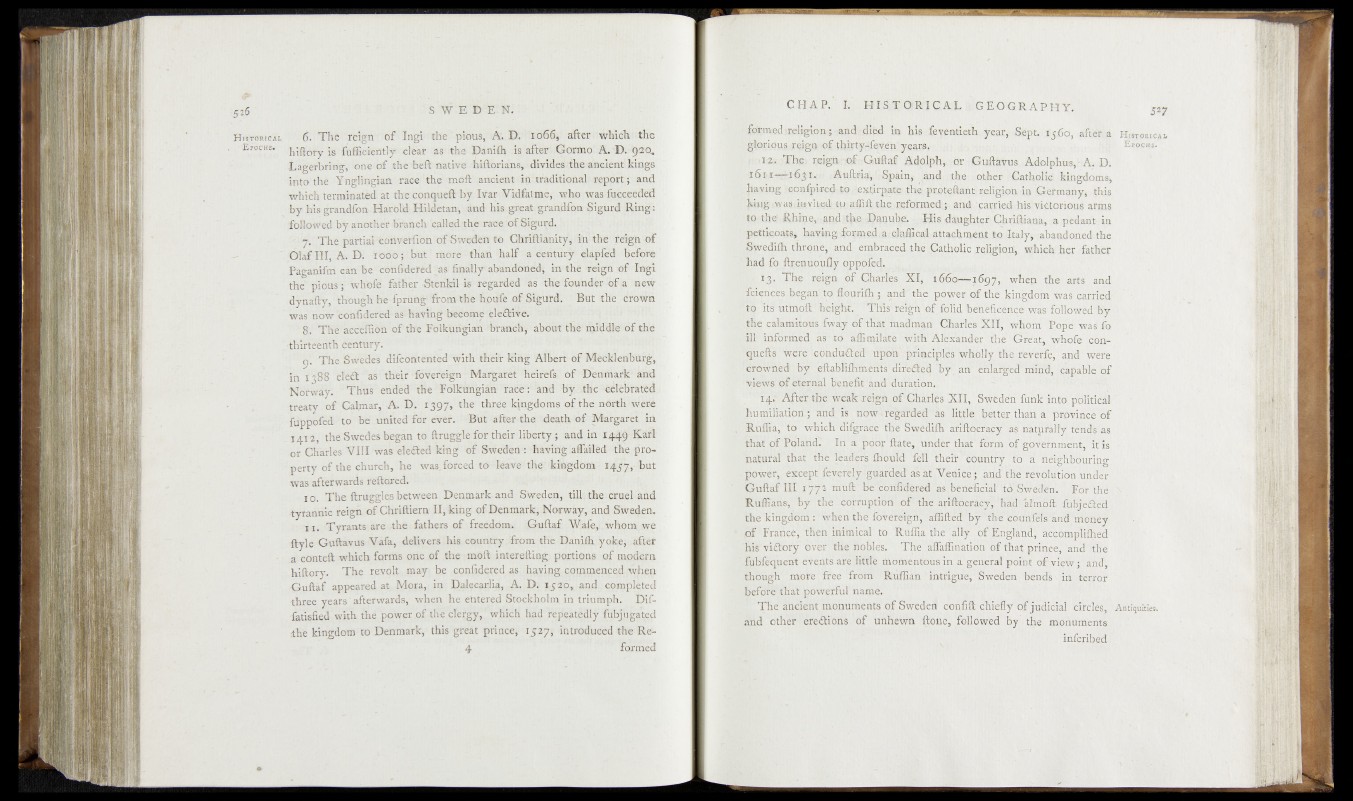
H ta róR icAL
_ -È iüècw s* ■
6. The reign o f Ingi the pious, A. D. i o.66, after which the
hiftory is fufEciefitiy cihar as the Danifh is after Gormo A. D. 920.
-Lagerbring, one of the beft native' hiftorians, i divides the ancient kings
into the Ynglingian race the mfift ancient in traditional report; and
which terminated at the conqueft by Ivar Vidfatme, who was fucceeded
by- his grandfon Harold Hildetan, and his .great grandfon Sigurd Ring:
followed by another branch called-the race of Sigurd. ;
-. y. The .partial éonverfxon tóf Sweden tió Chriftianity, in the1 ;r.è%n of
Olaf III, A. D. 1000 • but more than half a century elapfed before
Paganifni can be confidered jas- finally abandoned, in the reign o f Ingi
the pious; whofe father Stenkil is regarded as the founder o f a new
dynafty, though he fprung- from the hpufe o f Sigurd. But the crown
was now confidered as having become èlèdti-Ve.
8. The accéffion o f the Folkungian branch, about the middle o f the
•thirteenth century.
WM The Swedes difcontented with their king Albert of Mecklenburg,
in 1388 eleci as their -fovereign Margaret heirefs of Denmark and
Norway. Thus ended the Folkungian race: and by the celebrated
treaty, of Calmar, -A. D. 1397, the three kingdoms o f the north were
fqppofed to bejmited for ever. But after the death of Margaret in
1412, the Swedes began to ftruggle for their liberty; and in 1449 Karl
-or Charles V III was elected king o f Sweden : having affailed the property
of the church, he was, forced to - leave the kingdom 1457, but
was afterwards reftored.
10. The ftruggle^ between Denmark and Sweden, till the cruel and
tyrannic reign o f Chriftiern II, king of Denmark, Norway, and Sweden.
11 . Tyrants are the fathers of freedom.. Guftaf Wafe, whom we
Ryle Guftavus Vafa, delivers his country. from the Danifh yoke, after
,a conteft which forms one of the móft interefting, portions of modern
hiftory. The revolt may be confidered as. haying.gbmmenced when
-Guftaf appeared at Mora, in Dalecarjia, A. D. 1520, and completed
■ three years' afterwards,; when he entered Stockholm in triumph. Dif-
fatisfied with the power o f the clergy," which had repeatedly fubjugated
fthe kingdom to Denmark, this great prince; 1527; introduced the- Re-
‘ 4 1 farmed
formed -religion ; and died in his feventieth. year, .Sept. '.1-560,- after a
glorious -reign of thirty-feven'years. -1
•12. The reign Guftaf Adolph, or Guftavus , Adolphus, • A. D.
1611-7-1631. Au.ftria, Spain, and the other Catholic kingdoms,
having confpired. to . ^extirpate thé protçftant religion in Germany, this
king was,invited to affift the reformed,; and carried his victorious arms
to the- Rhine,and ithe -Danube;. His daughter Chriftianh, | | pedant in
petticoats, haymgrform-e.dta ;elaffical attachment to' Italy, abandoned the
,Swediffi throne^- andi' empraced thetCatholic gqligiqn, wjhieh her father
had fo ftçenuoufly oppoied.
&M - , The 'reign o f Chafe's Xft, 1660— 1697, whep.the arts and
fcienc.es began to flourifb ; and' the power of the kingdom was carried
to its utmoft height. This reign ;of folid beneficence was. followed by
.the calamitous fway of that madman Charles XII, whom Pope was fo
ill informed as to affimilite with Alexander the Great, whofe cbn-
quefts were conducted upon principles wholly the reverie, and were
crowned by eftablifhments dire<fted by an enlarged mind, capable of
views' of eternal benefit and duration. J
iqri Aftdr the weak reign ôf’Charfèë XII, Sweden- funk I'nt'plpdlitidal
humiliation ; and is now 1 regarded as little better than a prpvince of
Ruffia, to which difgrace the Swedilh ariftocracy_ as naturally tends as
that of Poland. In a poor ftate, under that form of government, it is
natural that the leaders fhould fell their country to a neighbouring
power, except feverely guarded as at Venice.; and the revolution under '
Guftaf III 1772 muft be confidered as beneficial 'tô'.Sweden. For the ;
Rufliaüsy. by the corruption of the ariftocracy, had almoft- fubjeâéd -
the kingdom : when the fovereign, affifted by the counfels and money
o f France, then inimical to Ruffia the ally of England, 'accomplished
his victory over the nobles. The afiaffination of that prihee, and the
fubfequent events are little momentous in a general point' o f view ; and,
though more free from Ruffian intrigue, Sweden bends in terror
before that powerful name. ''
The ancient monuments of Sweden confift chiefly o f judicial circles, -
and other erections of unhewn ftone, followed by the monuments
inferibed.
H i s t o r ic a l
E roch;S.
Antiquities.